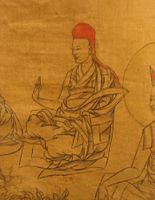ShAkya mchog ldan: Difference between revisions
No edit summary |
No edit summary |
||
| Line 16: | Line 16: | ||
|TibDateAnimal=Monkey | |TibDateAnimal=Monkey | ||
|TibDateRabjung=7 | |TibDateRabjung=7 | ||
|ReligiousAffiliation= | |ReligiousAffiliation=Sakya | ||
|StudentOf=rong ston shes bya kun rig; don yod dpal ba; Ngor mkhan chen, 1st; spyang lung chos sdings gzhon nu blo gros | |StudentOf=rong ston shes bya kun rig; don yod dpal ba; Ngor mkhan chen, 1st; spyang lung chos sdings gzhon nu blo gros | ||
|BdrcLink=https://www.tbrc.org/#!rid=P396 | |BdrcLink=https://www.tbrc.org/#!rid=P396 | ||
| Line 23: | Line 23: | ||
|BnwShortPersonBio=Śākya Chokden was one of the most important thinkers of the Sakya tradition. His teachers were Rongtön Sheja Kunrik, Dönyo Pelwa and Ngorchen Kunga Zangpo. A thinker who accepted both the rangton and zhentong, or "self-empty" and "other empty" views of Madhyamaka, Śākya Chokden's seat was at Serdokchen Monastery near Shigatse in Tsang. Influential and controversial in his own day, his writings fell out of favor over time and many were banned in the seventeenth century. | |BnwShortPersonBio=Śākya Chokden was one of the most important thinkers of the Sakya tradition. His teachers were Rongtön Sheja Kunrik, Dönyo Pelwa and Ngorchen Kunga Zangpo. A thinker who accepted both the rangton and zhentong, or "self-empty" and "other empty" views of Madhyamaka, Śākya Chokden's seat was at Serdokchen Monastery near Shigatse in Tsang. Influential and controversial in his own day, his writings fell out of favor over time and many were banned in the seventeenth century. | ||
|PosBuNayDefProv=Definitive | |PosBuNayDefProv=Definitive | ||
|PosBuNayDefProvNotes= | |PosBuNayDefProvNotes=Though his unique presentation allows for both definitive and provisional versions of buddha-nature. The distinction between the two depends on whether there is direct experience of the unstained buddha-nature and its corresponding qualities, or, alternatively whether this nature is latently present in an obscured form. | ||
|PosAllBuddha=Qualified No | |PosAllBuddha=Qualified No | ||
|PosAllBuddhaNote=All beings possess a "nominal" buddha-nature as is taught in the second-wheel teachings, while only bodhisattvas on the first bhumi and up (i.e. Noble Bodhisattvas) possess the "actual" buddha-nature as it was taught in the third-wheel teachings. (see note from Karl below) | |PosAllBuddhaNote=All beings possess a "nominal" buddha-nature as is taught in the second-wheel teachings, while only bodhisattvas on the first bhumi and up (i.e. Noble Bodhisattvas) possess the "actual" buddha-nature as it was taught in the third-wheel teachings. (see note from Karl below) | ||
Revision as of 10:55, 11 July 2018
| PersonType | Category:Classical Tibetan Authors |
|---|---|
| MainNamePhon | Śākya Chokden |
| MainNameTib | ཤཱཀྱ་མཆོག་ལྡན་ |
| MainNameWylie | shAkya mchog ldan |
| YearBirth | 1428 |
| YearDeath | 1507 |
| BornIn | gsang mda' bang rim |
| TibDateGender | Male |
| TibDateElement | Earth |
| TibDateAnimal | Monkey |
| TibDateRabjung | 7 |
| ReligiousAffiliation | Sakya |
| StudentOf | rong ston shes bya kun rig · don yod dpal ba · Ngorchen Kunga Zangpo · spyang lung chos sdings gzhon nu blo gros |
| BDRC | https://www.tbrc.org/#!rid=P396 |
| Treasury of Lives | https://treasuryoflives.org/biographies/view/%C5%9A%C4%81kya-Chokden/6351 |
| IsInGyatsa | No |
| BnwShortPersonBio | Śākya Chokden was one of the most important thinkers of the Sakya tradition. His teachers were Rongtön Sheja Kunrik, Dönyo Pelwa and Ngorchen Kunga Zangpo. A thinker who accepted both the rangton and zhentong, or "self-empty" and "other empty" views of Madhyamaka, Śākya Chokden's seat was at Serdokchen Monastery near Shigatse in Tsang. Influential and controversial in his own day, his writings fell out of favor over time and many were banned in the seventeenth century. |
| PosBuNayDefProv | Definitive |
| PosBuNayDefProvNotes | Though his unique presentation allows for both definitive and provisional versions of buddha-nature. The distinction between the two depends on whether there is direct experience of the unstained buddha-nature and its corresponding qualities, or, alternatively whether this nature is latently present in an obscured form. |
| PosAllBuddha | Qualified No |
| PosAllBuddhaNote | All beings possess a "nominal" buddha-nature as is taught in the second-wheel teachings, while only bodhisattvas on the first bhumi and up (i.e. Noble Bodhisattvas) possess the "actual" buddha-nature as it was taught in the third-wheel teachings. (see note from Karl below) |
| PosAllBuddhaMoreNotes |
|
| PosWheelTurn | Third Turning |
| PosWheelTurnNotes | He distinguishes between different types of buddha-nature taught in the second and third wheels, though the third is the more definitive and represents the "actual" tathāgatagarbha. |
| PosYogaMadhya | Madhyamaka |
| PosEmptyLuminNotes |
|
| Other wikis |
If the page does not yet exist on the remote wiki, you can paste the tag |

